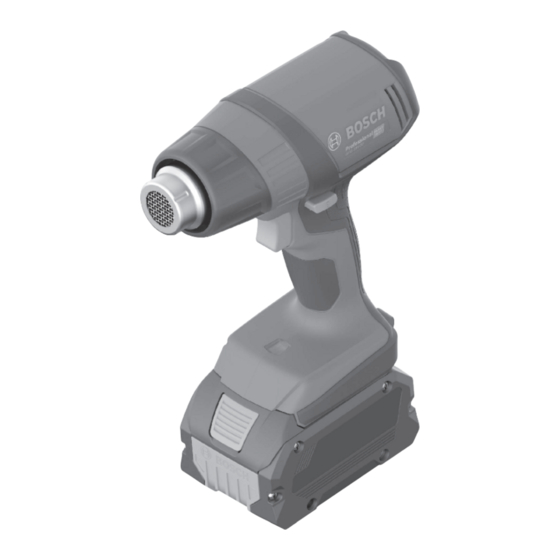Bosch Professional GHG 18V-50 작동/안전 지침 매뉴얼 - 페이지 5
{카테고리_이름} Bosch Professional GHG 18V-50에 대한 작동/안전 지침 매뉴얼을 온라인으로 검색하거나 PDF를 다운로드하세요. Bosch Professional GHG 18V-50 37 페이지.

IMPORTANT SAFETY INSTRUCTIONS FOR HEAT GUNS
Use a high phosphate detergent or triso-
dium phosphate (TSP) to wash and mop
areas.
10) At the end of each work session put the
paint chips and debris in a double plas-
tic bag, close it with tape or twist ties
and dispose of properly.
Develop a periodic maintenance schedule
for your tool. When cleaning a tool be care-
ful not to disassemble any portion of the
tool since internal wires may be misplaced
or pinched or safety guard return springs
may be improperly mounted. Certain clean-
ing agents such as gasoline, carbon tetra-
chloride, ammonia, etc. may damage plastic
parts.
Ensure the switch is in the off position be-
fore inserting battery pack. Inserting the
battery pack into power tools that have the
switch on invites accidents.
Do not use as a hairdryer or direct the hot
air blast at other people. The high tempera-
ture being produced may cause personal in-
jury.
Do not direct airflow directly on glass. Ex-
treme temperature changes may cause the
glass to break resulting in personal injury or
property damage.
Do not leave the tool unattended while it is
switched on.
Allow the tool to cool fully before storing.
Contact with tool while still hot may cause
personal injury and/or property damage.
1600A02E16 GHG18V-50 20211221.indd 5
READ THESE INSTRUCTIONS
Additional Safety Warnings
-5-
11) Remove protective clothing and work
shoes in the work area to avoid carrying
dust into the rest of the dwelling. Wash
work clothes separately. Wipe shoes off
with a wet rag that is then washed with
the work clothes. Wash hair and body
thoroughly with soap and water.
SAVE THESE INSTRUCTIONS
Some dust created by
power sanding, sawing,
grinding, drilling, and other construction ac-
tivities contains chemicals known to cause
cancer, birth defects or other reproductive
harm. Some examples of these chemicals
are:
• Lead from lead-based paints,
• Crystalline silica from bricks and cement
and other masonry products, and
• Arsenic and chromium from chemically-
treated lumber.
Your risk from these exposures varies, de-
pending on how often you do this type of
work. To reduce your exposure to these
chemicals: work in a well ventilated area,
and work with approved safety equipment,
such as those dust masks that are specially
designed to filter out microscopic particles.
THINK SAFETY
SAFETY IS A COMBINATION OF OPERATOR
COMMON SENSE AND ALERTNESS AT ALL
TIMES WHEN POWER TOOLS ARE BEING
USED.
12/21/21 7:51 AM
